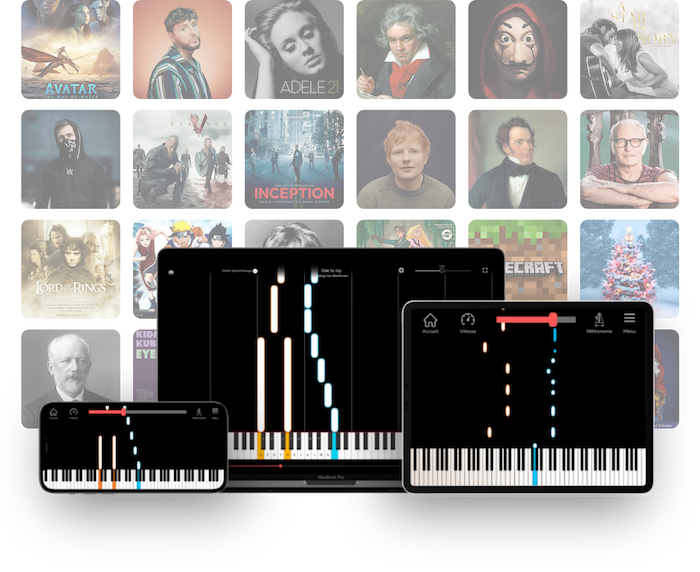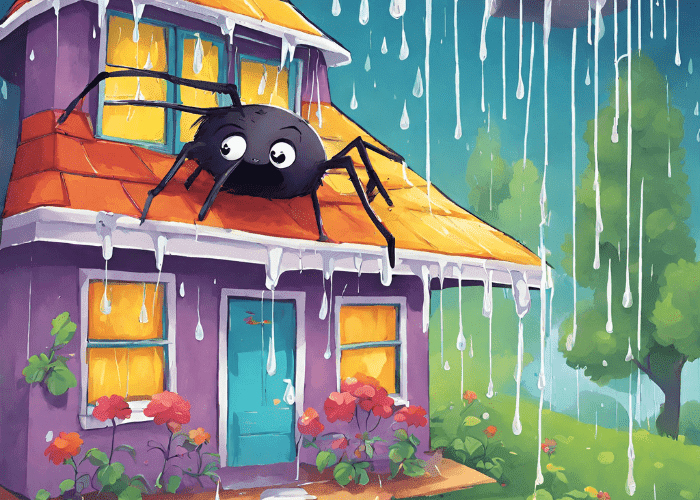
Would you like to learn to play the notes of the famous nursery rhyme The Itsy Bitsy Spider on the piano? Then climb the gutter with us!
A famous nursery rhyme with a fun, catchy rhythm, it’s about a spider who wants to climb up the gutter. If you lose your smile when it rains, then sing the rain ditty at the top of your lungs: ” The Itsy Bitsy Spider went up the water spout. Down came the rain, and washed the spider out. Out came the sun, …”
This song is a magnificent introduction to the world of the piano. The notes follow each other gently, like steps in a dance, and with a little practice you’ll master them in no time. You’ll start by learning which notes to play with your right hand, then the notes to play with your left. Eventually, you’ll learn to play with both hands simultaneously.
With our tutorial, you can learn to play this song for toddlers with ease and amaze those around you. At the end of this article, we’ll even give you the chance to download the piano score for this nursery rhyme.
So what are you waiting for? Get out your keyboard and let yourself be carried away by The Itsy Bitsy Spider!
Bonus : you can also learn to play this song at your own pace on our interactive piano learning app La Touche Musicale.
Free download: >> >> The guide to learn 10 easy piano pieces.
Learn to play your favorite songs on the piano
The La Touche Musicale learning app offers more than 2,500 songs to play easily on the piano. Connect your piano to your device and learn to play them at your own pace while having fun.
Before we start learning the notes of The Itsy Bitsy Spider nursery rhyme on the piano, let’s take a moment to familiarize ourselves with the keyboard. Below you’ll find an illustration detailing the location of each note on the keyboard:

The name of the notes on a piano keyboard.
Look closely at the piano diagram. What have you deduced? We’re sure your observations coincide with ours! Here are a few explanations:
White keys correspond to natural notes and black keys correspond to altered notes: sharps # and flats♭.
A keyboard is made up of sections, each section having 7 white keys. Each white key corresponds to a musical note: C, D, E, F, G, A, B. When you reach the 8th note, the cycle repeats in exactly the same way. This is called an octave.
To find a note more easily, you can use the black keys. They are not uniform. They are organized in groups of two (highlighted in brown) and three (highlighted in green). These groupings help us find our way around the piano.
The first note to identify is the reference note: C. Start by looking for a group of two black keys in the center of your keyboard. Then look for the white key just to the left of this group of two black keys: this is C.
To better orient yourself on the piano and improve your ability to navigate the keyboard, you can associate each finger of the right hand with a key, starting from the thumb on the C note. For the left hand, apply the same principle, associating the little finger with the note C a little to the left.
Before you start learning this piece, take the time to practice quickly locating the notes on the piano keyboard. This will make it easier for you when we come to the notes of this nursery rhyme.
Go through the keyboard with enthusiasm, each note a joyful invitation to the melody that awaits you!
By this stage, you’ve already spun your web across the piano keyboard, nimbly exploring every nook and cranny like a mischievous spider. Now let’s dive into the notes of The Itsy Bitsy Spider melody on the piano, which you’ll resonate with your right hand. These notes often captivate the ear with their familiar melody, evoking childhood memories we all share.
To begin, place your deft finger on the key corresponding to the first note of this melody: the C note.

The note C is the first note to be played with your right hand for the nursery rhyme The Itsy Bitsy Spider on piano.
Now that you’ve identified the first note, let’s explore the notes of The Itsy Bitsy Spider melody on the piano, which you’ll play with your right hand. Press the following keys in succession:
C – C – C – D – E – E – E – D – C – D – E – C – E – E – F – G – G – F – E – F – G – E – C – C – D – E – E – D – C – D – E – C – C – C – C – D – E – E – E – D – C – D – E – C
By playing these notes one after the other, did you quickly identify the melody of this nursery rhyme? Yes! Perfect! Repeat this sequence of notes several times, and then you’ll be able to move on to the next step.
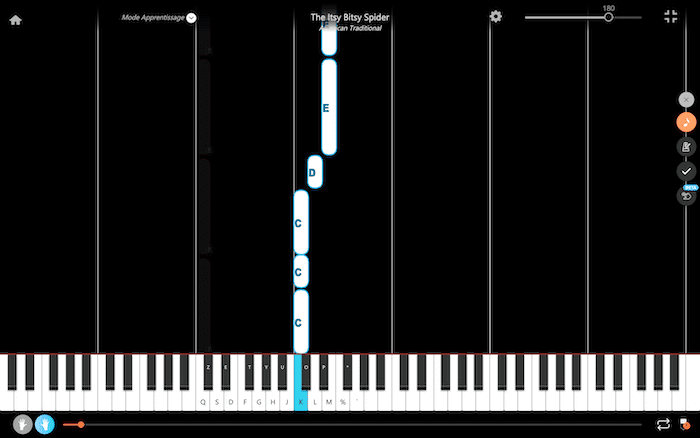
The Itsy Bitsy Spider on the piano: the notes of the right hand.
Discover our exclusive video tutorial, taken from our La Touche Musicale app, which will add an interactive dimension to your learning.
Watch the video as it guides you through the notes and rhythm to be played on your keyboard. Press and hold the keys as shown on the virtual keyboard.
Worried that the rhythm is too fast? If you have our app, in learning mode, it will wait for you to play the right notes before moving on. Otherwise, simply stop the video to reposition your fingers.
And off you go! Weave your musical web!
Congratulations, you’ve passed with flying colors! The right-hand notes of this piano song are now yours, and this is the start of a fabulous musical journey. But let’s not stop here! Now it’s time for the left hand to take up the challenge.
Will you also be able to tame Itsy Bitsy with your left hand?!
La Touche Musicale app waits for you to play the right note with your right hand on your piano before moving on to the next one.
Now let’s discover the accompaniment notes for The Itsy Bitsy Spider on piano to be played with the left hand. The accompaniment consists of playing the chords and the often lower notes that support the main melody, adding depth and richness to the music.
Following the same method as for the right hand, let’s identify the first note to be played with your left hand: it’s the G note.

The note G is the first note to be played with your left hand for the nursery rhyme The Itsy Bitsy Spider on piano.
The Sol note is identified ? Great! Let’s continue with the complete notes of The Itsy Bitsy Spider piano accompaniment.
In the accompaniment, the notes to be played with the left hand include some chords symbolized with a “+”, for example: “F + G”. When you reach this passage, simply press the F and G keys at the same time.
Press the keys corresponding to the following notes:
G – C – C – C – C – G – G – E – C – C – C – C – C – G – G – E – C – C – C – C – C – G – G – C – G – G – F + G – F + G – C + E + G
Once you’ve mastered all these notes on the piano, you can celebrate your success and move on to our video tutorial!
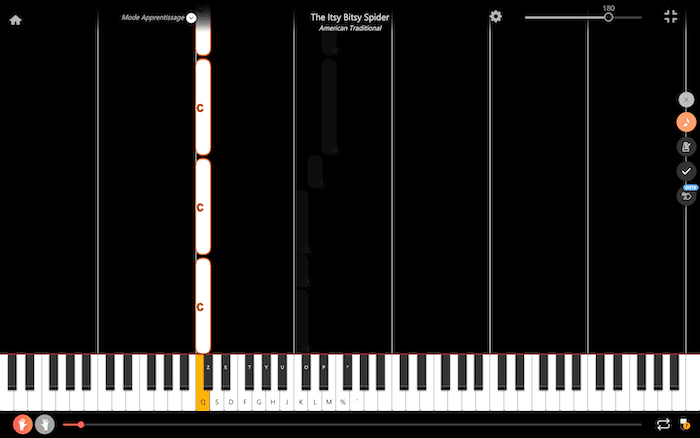
The Itsy Bitsy Spider on the piano: the notes of the left hand.
In this video tutorial for your left hand, we teach you how to play the notes of The Itsy Bitsy Spider‘s piano accompaniment in rhythm. Simply follow the instructions in the video as you did for your right hand: the right notes, the right keys and the right duration. Don’t hesitate to pause the video if necessary, as learning is not a race and should be done at your own pace.
Now play and make Itsy Bitsy dance!
The La Touche Musicale app waits for you to play the correct note with your left hand on your piano before moving on to the next.
Well done for mastering the left-hand accompaniment! Now we’re going to learn how to coordinate both hands to play the notes of The Itsy Bitsy Spider in its entirety on the piano. This is an important step in your musical progress, and we look forward to accompanying you in this new phase of your learning.
Now that you’ve mastered the melody with your right hand and the accompaniment with your left, let’s move on to the next step: performing both at the same time. Here are a few valuable tips to help you make this step a moment of extraordinary pleasure. It’s all about having fun with the most exciting part of your learning!
Our tips:
With a little determination, you’ll soon be able to play the notes of this piano piece with ease and confidence, impressing your audience with your mastery!
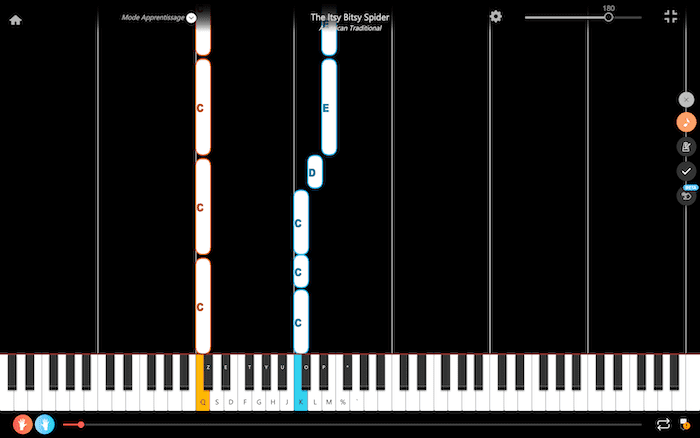
The Itsy Bitsy Spider on the piano: the notes of both hands.
In this latest video tutorial, discover how to play the notes of the nursery rhyme The Itsy Bitsy Spider on the piano with both hands. Follow the on-screen instructions and let the music guide you. If the rhythm seems too fast, don’t worry! You can pause the video to give yourself time to place your fingers correctly on the keyboard.
And don’t forget that our La Touche Musicale app can help you acquire outstanding hand skills. As a reminder, the learning mode waits patiently for you to play the right note, and that, let’s face it, is pretty cool! You’ll also be able to easily connect your keyboard and display notes in Latin (Do, Ré, Mi, etc.) or Anglo-Saxon (C, D, E, etc.) versions. We won’t list all its features here, but we invite you to discover it for yourself.
So, are you ready to take up the challenge and keep Itsy Bitsy dancing to the rhythm of your music? Let’s go!
Ajoutez votre titre ici
The La Touche Musicale app waits for you to play the right notes with both hands on your piano before moving on to the next.
Congratulations! You’ve done it! You’ve now mastered the art of taming the notes of The Itsy Bitsy Spider with both hands on the piano. Congratulations!
If you’ve enjoyed this article, why not continue exploring the tutorials on our blog? We’ve prepared a selection for you, but you can also find others in a variety of styles:
Itsy Bitsy is now your musical ally. But what’s a musician without his sheet music? We’re delighted to offer you the PDF score of this charming nursery rhyme. Download it here: The Itsy Bitsy Spider Partition PDF.
Continue playing the notes of this song for toddlers on the piano with ease, thanks to our La Touche Musicale app.
We’d like to thank you for following this tutorial. It’s been a real pleasure to go through this step with you!
See you soon for new musical adventures!
Share the article on:
La Touche Musicale offers powerful AI apps to help you learn, play, and transcribe music effortlessly. Discover them below.
Ideal for: solo piano

Transcribe your piano pieces to sheet music with unrivalled precision.
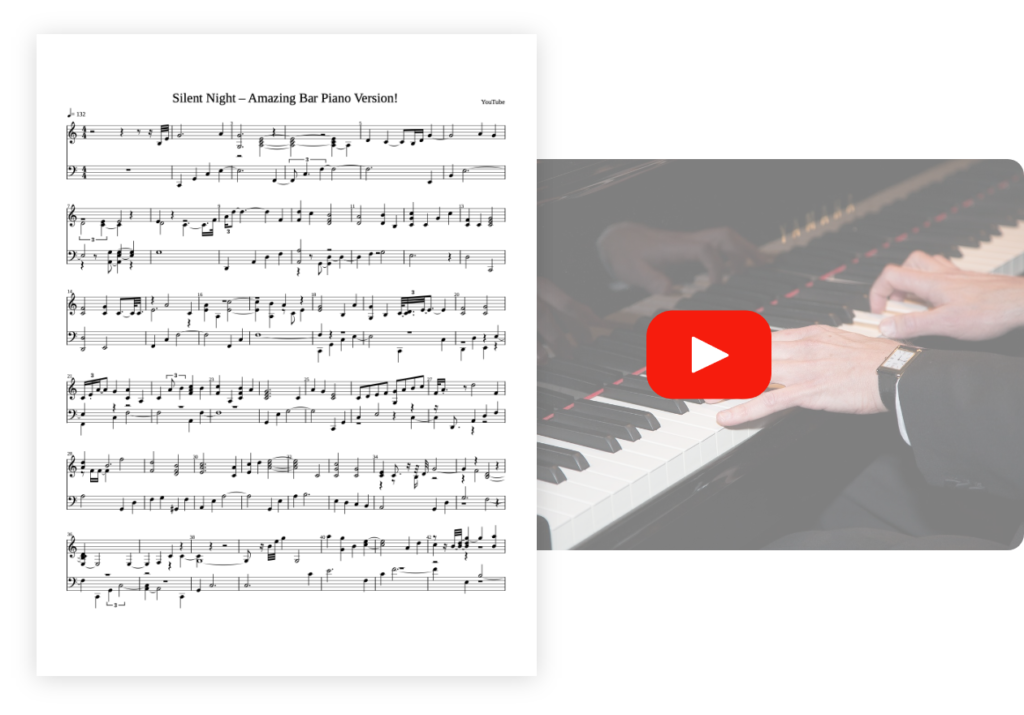
Ideal for: solo guitar

Transcribe your guitar tunes into tablature with unrivalled precision.
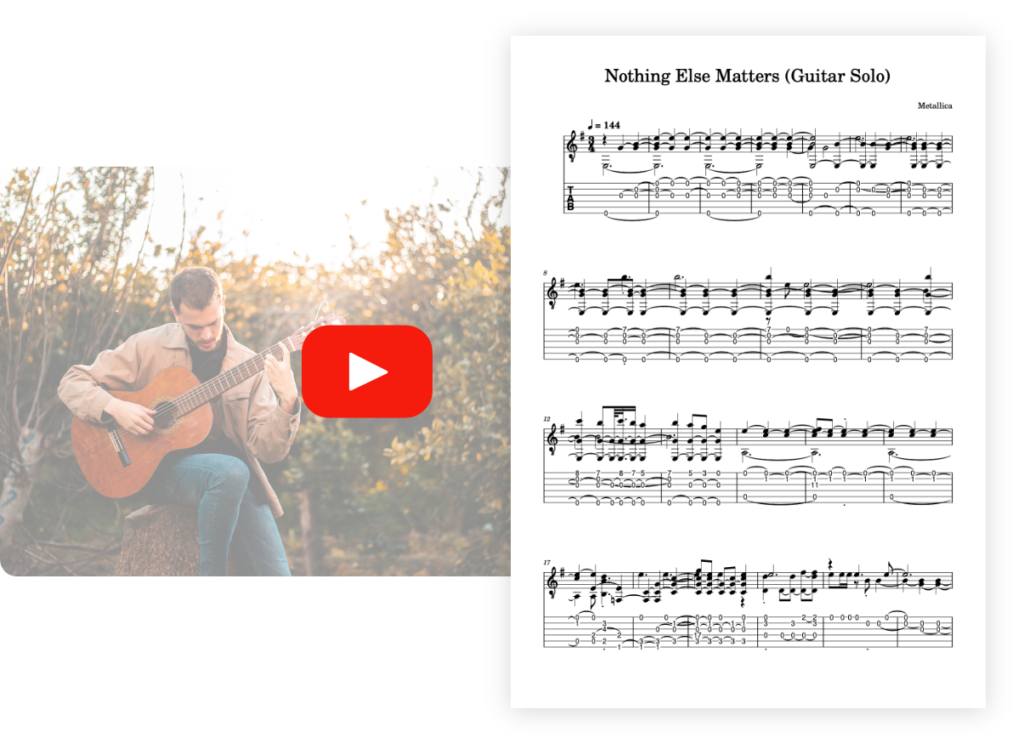
Ideal for: solo vocals

Transcribe your vocal recordings into sheet music with unrivalled precision.
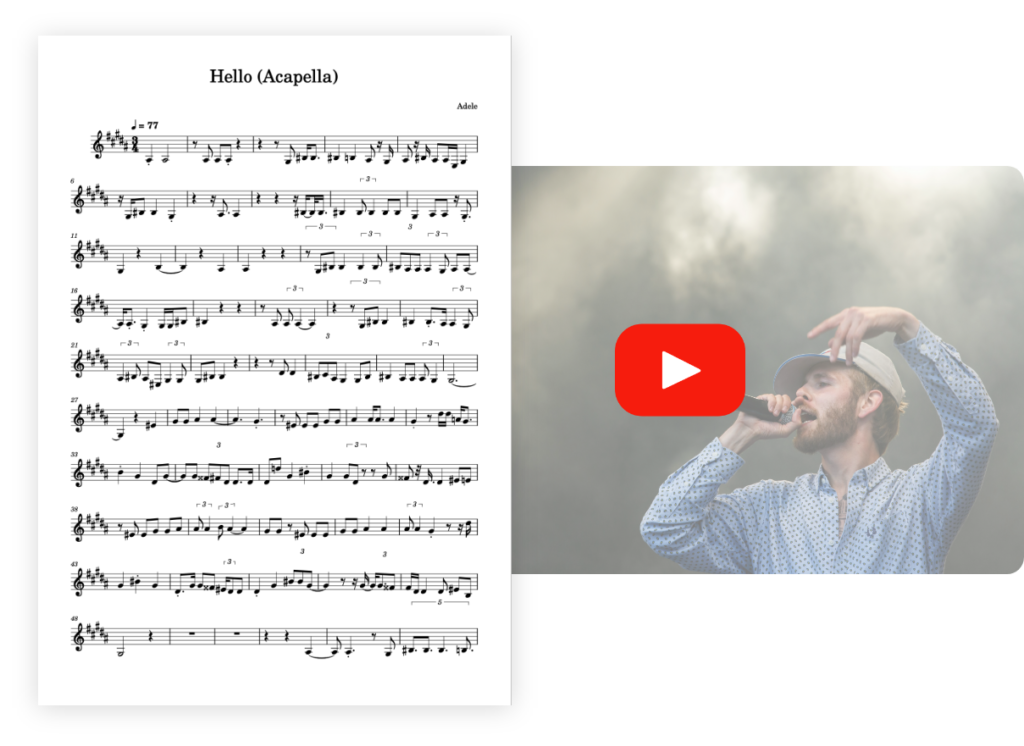
Ideal for: multi-instruments

Transcribe your multi-instrument tracks into sheet music with unrivalled precision.
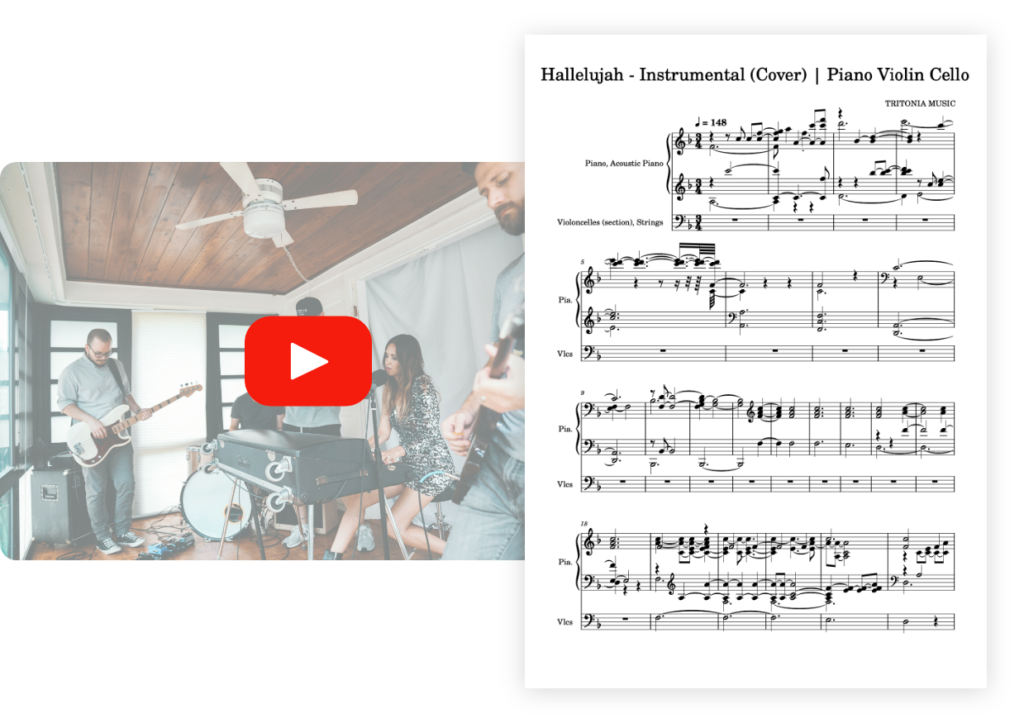
Ideal for: solo drums

Transcribe your drum tracks into sheet music with unrivalled precision.
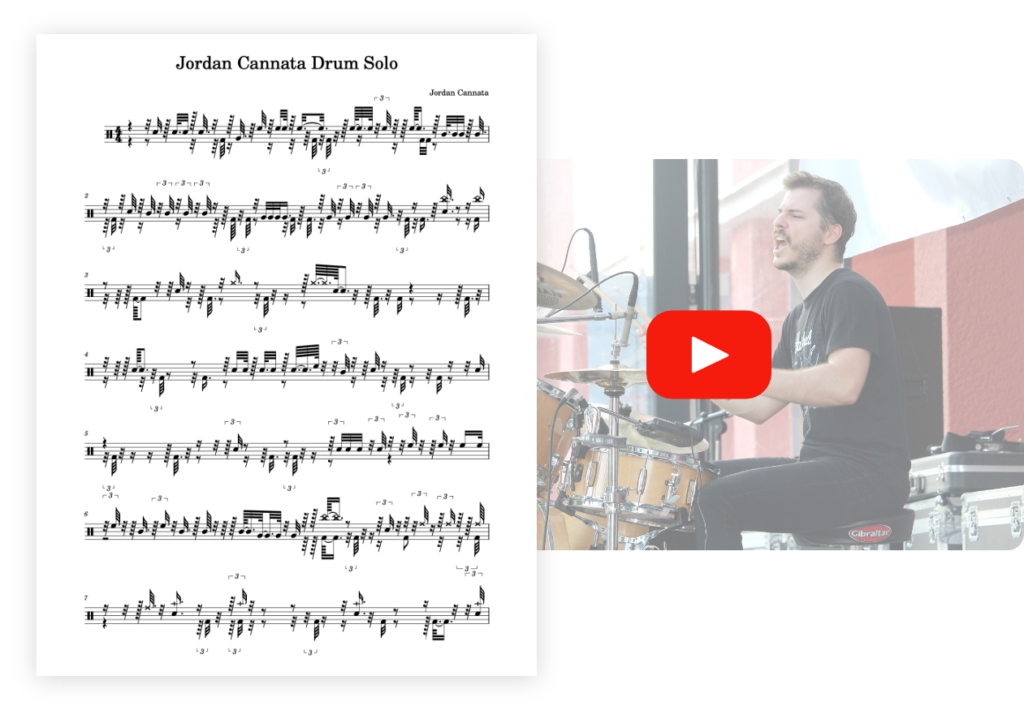
Ideal for: solo violin

Transcribe your violin pieces into sheet music with unrivalled precision.
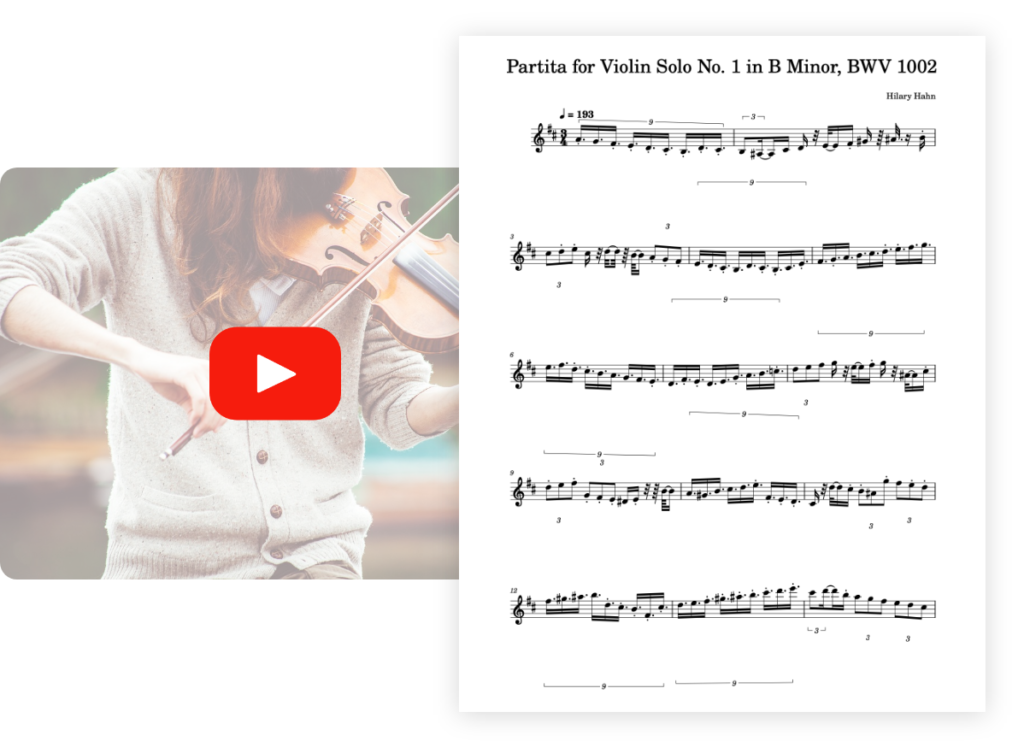
Optimized for: solo saxophone 🎷

Transcribe your saxophone pieces into sheet music with unrivaled precision.
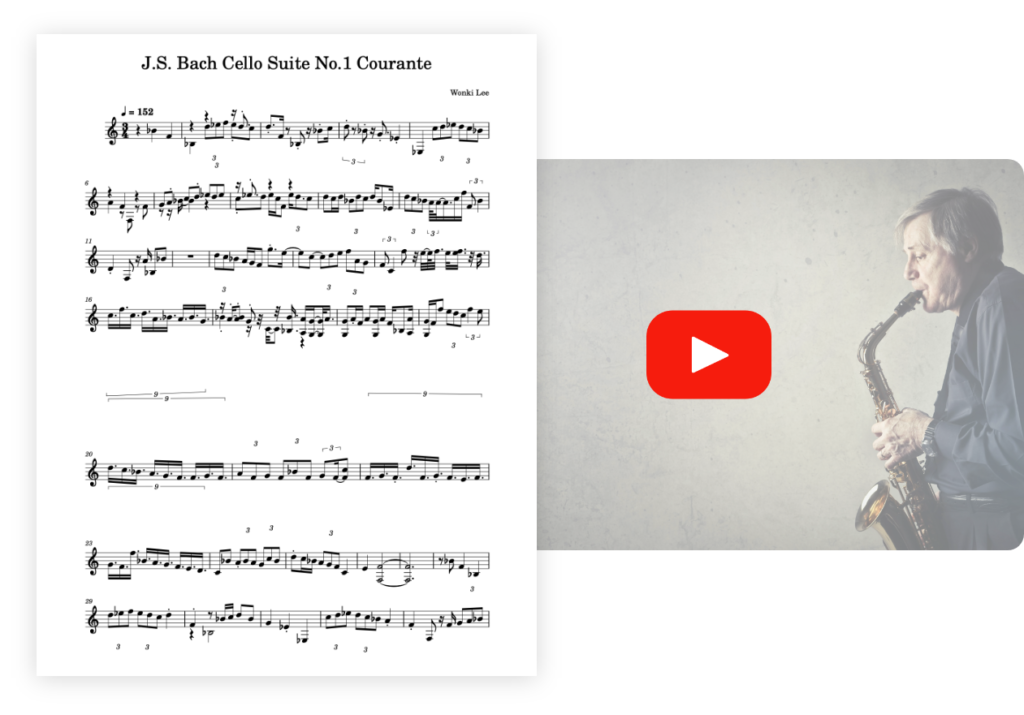
Optimized for : solo flute 🪈

Transcribe your flute pieces into sheet music with unrivaled precision.
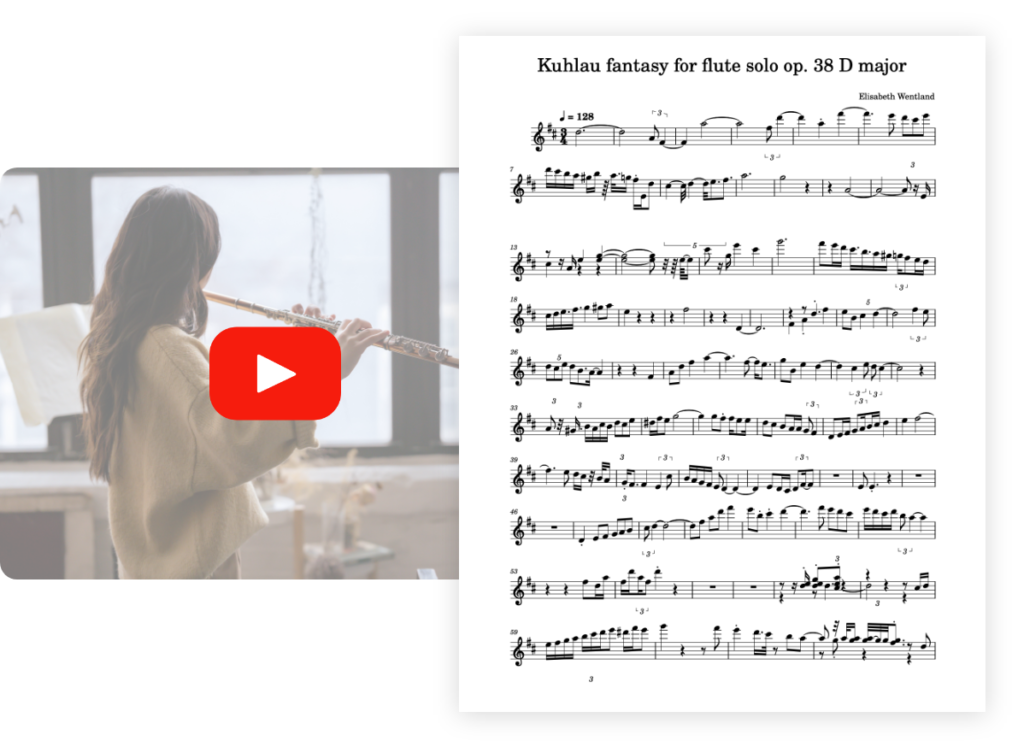
Optimized for : solo bass 🪕

Transcribe your bass pieces into sheet music with unrivaled precision.
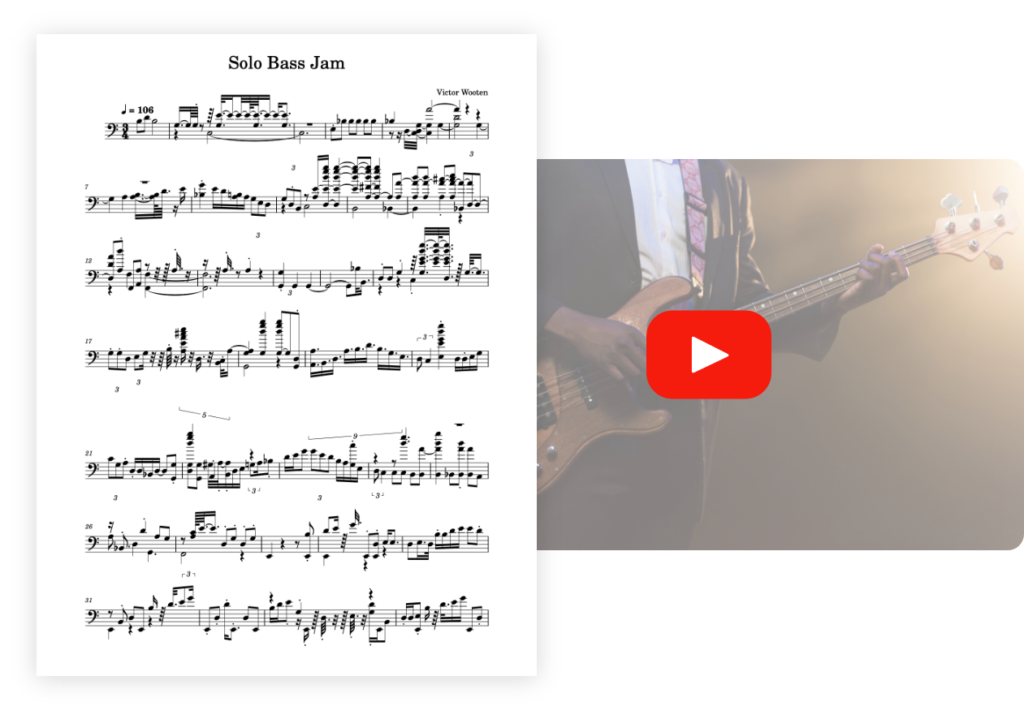
PianoGo lets you learn to play over 3,000 songs easily on the piano.
